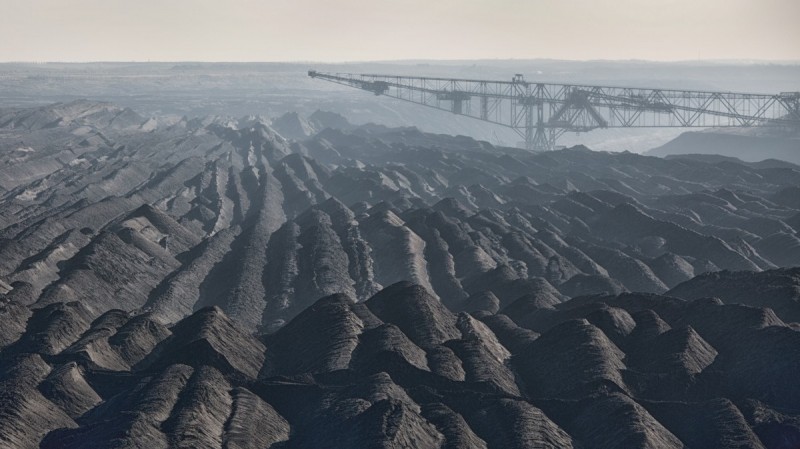By Megan Darby in Berlin
The fate of 8,000 workers in Vattenfall’s lignite – brown coal – business will not be decided in Lusatia, their eastern German base.
It won’t even be decided in Berlin, the federal capital. It’s London where the financiers will trade the five opencast mines and four power stations.
“We are the carpet, not the salesman,” says Rudiger Siebers, chairman of the company’s general works council and IG BCE union representative.
A mining region since the mid-nineteenth century, Lusatia is proud of its industrial heritage. Yet there is a sense that resistance to change is giving way to resignation, as its greatest natural asset becomes a liability.
Siebers is showing journalists Welzow Sud, a vast open pit with a power plant on the horizon. Vattenfall has built a viewing platform, the better to see how it tears open the landscape to reach a thin layer of soft, crumbly coal. A machine the length of 15 London buses is excavating in the distance; no people are visible.
Nor do you see the 136 villages bulldozed to make way for mining, points out co-guide and anti-lignite campaigner Thomas Burchard.
Report: Germany mulls ‘mammoth’ 95% cut in emissions by 2050
One of the cheapest and dirtiest forms of generation, lignite has clung to a 25% share of the German power mix. Even as renewables ramped up fast, the government prioritised a phase-out of nuclear. Surplus electricity – some 10% – is exported.
It is one reason why the country’s greenhouse gas emissions rose slightly last year: 0.7% according to official estimates. And it is a sector the government cannot afford to ignore as it looks to slash CO2 95% by 2050.
As recently as 2014, Vattenfall was planning to expand production – a move that would mean razing more homes. Along with groundwater contamination, that is Burchard’s main concern: “It’s hard to explain why somebody’s house should be torn down so somebody else can make a profit selling electricity abroad.”
Now, the Swedish state-owned utility is under political pressure to clean up its portfolio. It wants to sell off the polluting business. But the tide is turning and buyers are scarce.
Valued at around €2 billion in October 2014, several reports now estimate its worth in negative figures, with bidders demanding cash for decommissioning. The main interest has come from Czech firms, but CEZ ruled itself out, leaving Czech Coal and EPH to submit binding offers.
It vindicates Greenpeace Sweden, which sought to acquire the assets in order to shut them down. Once social and environmental costs were factored in, the NGO said the net liabilities amounted to €2 billion. It was excluded from the bidding, however. Vattenfall is not commenting on the process.
What has changed? The German government has no policy to end coal burning – yet. But after 195 countries agreed a pact in Paris last December to tackle climate change, it looks inevitable.
Clean energy policies are already beginning to bite. Power prices, depressed by a state-backed surge in renewable generation, have fallen around 40% since Vattenfall announced the sale. Utilities are making losses on lignite in an oversupplied market.
More direct intervention could be needed to finish the job, but this is sensitive territory. A previous plan to impose a levy on old coal plants was dropped after an industry backlash.
Timetable taboo
Officials at the environment ministry studiously avoid naming any end dates, in a press briefing. They do not wish to prejudge the 2050 climate strategy due to be presented to cabinet in June.
Ministers for environment, foreign affairs, economics and energy are equally silent on the matter, at an international conference in Berlin to promote their renewables policy.
In a Guardian article, top economics official Rainer Baake acknowledges the challenge of keeping coal, oil and gas in the ground. But while stressing the importance of avoiding investment in new mines, he ducks the issue of what to do with existing capacity.
Others have made suggestions. Agora Energiewende, a think tank specialising in Germany’s energy transition, recommends eliminating coal from the power market by 2040. It is a conservative timeline, which would see Germany breach its 2020 emissions target, but – analysts say – hit subsequent milestones.
Barbara Praetorius, deputy director at the organisation, says it is “politically unrealistic” to shut down plants faster.
The radicals at Barclays Bank, on the other hand, say German coal will be worthless within 15 years if the Paris deal takes effect. Analyst Mark Lewis explains in a research note the international goal to hold warming “well below 2C” leaves very little room for lignite after 2030.
For locals in a panel discussion in Grossraeschen, a village near Welzow Sud, that is an alarming prospect.
Simone Wendler, chief reporter at Lausitzer Rundschau newspaper, describes how the region has floundered economically since East and West Germany reunited in 1990. The number of jobs in mining fell from around 100,000 to 8,000. Despite efforts at regeneration, many people moved away, retired early or became unemployed.
Under business as usual, the Welzow Sud has enough lignite to run until 2040. If expanded, it would be 2050. The only other major industry is represented by chemicals firm BASF.
“I would like to see Lusatia being an industrial region even in a post-coal era, but I have some doubts,” says Wendler. “The region is really trying to come up with new ideas… [but] there are very few reasons to come here for other companies. It is not a place where a company listed on the German stock exchange wants to have its headquarters.”
Maik Bethge, head of the chamber of commerce for Cottbus, the nearest city, attempts to be more upbeat. “Lusatia does see itself as an energy region, both in the past and also for the future,” he says. “We will face difficulties, there is no doubt about it, but we are also prioritising innovation.”

A dry marina in Grossraeschen waits for a former lignite pit to fill with water, to become a lake and tourist attraction (Credit: Osha Gray Davidson)
Lusatia is not without natural charms. Wind farms rise above spindly forests of pine and silver birch. Villages have duck ponds and colourful plastic eggs hung on bushes for Easter.
Grossraeschen is trying to rebrand as a tourist destination, turning a former coal pit into an artificial lake. A 4* hotel stands ready to accept hordes of holidaymakers. Lakeside apartments were planned.
Unfortunately, the water has not arrived. It is several years behind schedule filling up from a nearby river. A marina for yachts stands high and dry.
A developed country, Germany is expected – and purports – to lead on decarbonising its economy. Under the Paris climate deal, emissions worldwide must be reduced to near zero in the second half of the century. Mining communities in Australia, China and India are ultimately headed for their own transformation.
As Lusatia grapples with its new reality, the world is watching.
Megan Darby’s travel and accommodation in Germany was paid for by Clean Energy Wire


